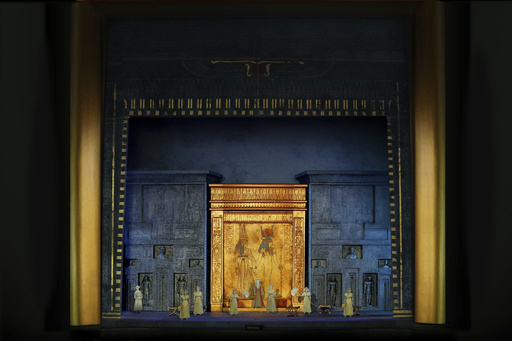
The financially struggling Metropolitan Opera will present 18 productions in 2024-25, matching the current season and pandemic-curtailed 2019-20 for the fewest since 14 in strike-shortened 1980-81.
Met general manager Peter Gelb kept up his pivot to contemporary works, starting the season with Jeanine Tesori’s “Grounded” on Sept. 23, then presenting Osvaldo Golijov’s “Ainadamar” opening Oct. 15 and John Adams’ “Antony and Cleopatra” beginning May 12, 2025.
“Aida” is the sole totally new production plus five new-to-the-Met stagings. There will be 194 performances under the schedule announced Wednesday, matching the current season and down from 215 in 2022-23.
Under Gelb the Met has withdrawn $40 million from the company’s endowment, reducing it to about $255 million. The Met had a recent high of 28 productions in 2007-08.
“We need to make the season compelling and interesting and vital and appealing to both the older audiences as well as the increasing number of new audiences who are attending,” Gelb said. ”We also have the financial constraints that the post-pandemic world has left us in.”
Contemporary works had varying box office success in this season’s first half. Anthony Davis’ “X: The Life and Times of Malcolm X” sold 78% of available seats, Daniel Catán’s “Florencia en el Amazonas” 68% and Heggie’s “Dead Man Walking” 62%.
“Not everything we do is going to be a home run at the box office even if they are artistically home runs,” Gelb said.
Overall ticket sales in the first half were 73%, up from 62.7% in the first part of the 2022-23 season. A new staging of Bizet’s “Carmen” sold 84% and Mozart’s “The Magic Flute” topped revivals at 87%, followed by Puccini’s “La Bohème” (74%), Verdi’s “Nabucco” (71%), Wagner’s “Tannhäuser” (64%) and Verdi’s “Un Ballo in Maschera (A Masked Ball)” (56%).
“Grounded,” about a female fighter pilot with a libretto by George Brant, had its world premiere at the Washington National Opera last fall. Emily D’Angelo and Ben Bliss star in Michael Mayer’s staging, and Met music director Yannick Nézet-Séguin conducts.
“Act 1 has been restructured. It’s shorter. And new music has been written by Jeanine,” Gelb said.
Mayer’s version of “Aida” that opens on New Year’s Eve was announced in 2017 as a co-production with Moscow’s Bolshoi Theatre and was to have opened the Met’s 2020-21 season. It was pushed back by the pandemic and the Bolshoi’s participation was dropped after Russia’s 2022 invasion of Ukraine. It replaces a lavish Sonja Frisell production that appeared 262 times from 1988 through last year. Angel Blue and Piotr Beczała star.
Mayer frames the story as being discovered by an archaeologist reading hieroglyphics in a tomb.
“The world has changed so much since we started the project. The concept came out of a very different time and place,” Mayer said.
Claus Guth’s staging of Strauss’ “Salome” opening April 29, 2025, originally was a co-production that appeared at the Bolshoi in 2021 before the Met severed ties. Elza van den Heever stars and Nézet-Séguin conducts.
“Ainadamar” is seen in Deborah Colker’s staging that was first at the Scottish Opera in 2022; “Moby-Dick” (March 3) in the Leonard Foglia production from its Dallas Opera premiere in 2010; and “Antony and Cleopatra” with Adams conducting in Elkhanah Pulitzer’s staging from the San Francisco Opera’s world premiere in 2022.
Rising star soprano Lise Davidsen appears in revivals of Puccini’s “Tosca” and Beethoven’s “Fidelio.”
Guth’s production of Handel’s “Semele” was pushed back to a later season. Gelb said previously delayed stagings on track for future seasons include Bellini’s “La Sonnambula” by Rolando Villazón and Weill’s “Rise and Fall of the City of Mahagonny” by Ivo van Hove.
Next season joins 2013-14 as the only seasons without Wagner since anti-German sentiment in 1918-19 caused by World War I.
High-definition simulcasts to movie theaters were cut to eight, down from nine this season and 10 in 2022-23. The winter break instituted in 2022 was increased to five weeks from four.
Source: post
